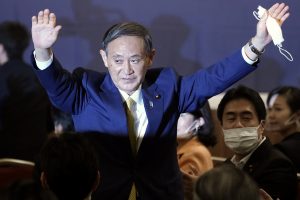As anticipated, Suga Yoshihide has won the election for the leadership of Japan’s Liberal Democratic Party (LDP) following Prime Minister Abe Shinzo’s decision to step down. Suga defeated rivals Kishida Fumio and Ishiba Shigeru in a landslide victory.
Suga, the chief cabinet secretary throughout Abe’s record-long term, does not have a flashy image, nor a celebrity profile. But he is known as a tenacious political fighter, seeking to reform the LDP from within and to force through incremental but profound changes to the major institutions that control Japan’s society. He has warned that the bureaucratic structure of the civil service is hampering the government’s response to COVID-19.
There is no general election scheduled in Japan until the autumn of next year. However, speculation is rife that Suga may seek to dissolve the lower house of parliament and go to the polls as soon as this November.
The opposition parties are seen as disorganized and divided, so many pollsters believe an early election would give the LDP an advantage. If it manages another win, this would give Suga a clear mandate to govern.
Most of his political experience is in the domestic field, rather than in international affairs, although he has accompanied Abe on trips abroad and stood by his side during conversations with world leaders.
Suga has also served as the top government spokesman since 2012. It was in that role, earlier this year, that he publicly condemned South Korea for making what he said were “unreasonable demands” for compensation relating to the period when Japan occupied the Korean peninsula prior to World War II.
Shigeto Nagai, who heads the Japan team at Oxford Economics, regards Suga as less hawkish and more pragmatic than his rivals. Nagai says: “We are still not sure how Mr. Suga will perform as a prime minister and as the chief diplomat of this country but he might take a more practical approach and he may be more prepared to make compromises than other people in his party.”
“However,” Nagai continued, “he cannot go against the policies set by the LDP and the party is currently not showing any softening of attitude towards South Korea.”
Nagai believes that the public mood in Japan is currently more negative toward South Korea than it is on China. He says there may be an economic reason for this: “Japan’s reliance on China is much larger than on South Korea. The challenge for any Japanese prime minister is always to balance the relationship between China and the United States. I think under Mr. Suga’s leadership, Japan will continue to be an important ally of America and at the same time try to be nice to China.”
One of Suga’s supporters within the LDP is Nikai Toshihiro, long considered to be one of the party’s most pro-China members. As prime minister, Suga will probably keep Nikai as LDP secretary-general, allowing him to retain his strong influence.
This frustrates Yasuo Naito, deputy editor of the conservative-leaning Sankei newspaper, which supports the LDP.
“It worries me that Mr. Nikai might push Mr. Suga towards accommodating China economically. I think that’s a mistake, especially when China and the U.S. are engaged in a new cold war,” says Naito.
“South Korea just criticizes Japan and there is a really strong anti-Japanese sentiment in Korea at the moment. But the Chinese are more shrewd politically. They are thinking about the benefits of the Japan relationship. So it’s wrong to conclude that just because Mr Suga has been tough on South Korea, he will also be tough on China – they are completely different countries and different situations,” adds Naito.
In an editorial published the day after Suga was picked as LDP leader, China’s Global Times newspaper, which gives voice to mainstream (and often hawkish) political thinking, congratulated him and said that “maintaining cooperation with China will be Japan’s best choice.” It also said that “Japan no longer poses a major threat to China.”
The financial markets seemed to be reassured by the smooth transfer of power in Tokyo. Share prices and the value of the yen have held steady.
Investors expect no major change of economic policy under Suga. He has stated that his priority is to help Japan through the COVID-19 crisis and he has indicated that he will support low interest rates and more fiscal stimulus, aimed especially at helping Japan’s less developed regions. Suga is from Akita prefecture, a largely rural area, which has suffered from depopulation due to a lack of job opportunities.
Early in his second stint as prime minister, Abe laid out in his famous Abenomics program using the metaphor of three arrows. The third arrow was based on the concept of structural reform. Shigeto Nagai of Oxford Economics hopes that Suga has the energy to continue with that process. “He’s got a good track record with dealing with bureaucracy but the government has a terrible record in terms of getting to grips with fintech [financial technology], mobile apps, and IT.”
Nagai says: “To really raise the fundamental growth rate of this country, we must increase productivity. Abe was right to focus on that. Having a new prime minister who takes on bureaucracy should help but it will take years to achieve a good outcome.”
Duncan Bartlett is the editor of Asian Affairs and a former BBC Tokyo correspondent.

































